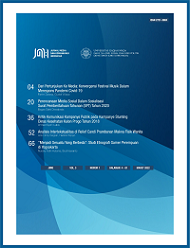Praktik Komodifikasi dan Kepelikan Sistem dalam Shopee Affiliates Program
Hikmatul Arifah Fitriani(1*)
(1) Program Studi S2 Kajian Budaya dan Media Sekolah Pascasarjana, Universitas Gadjah Mada
(*) Corresponding Author
Abstract
Technological developments bring us to live an easy life. This not only disrupts human activities in the field of technology but also spreads to various other fields such as economics, politics, and social affairs. Many things that once seemed impossible, have become possible. One example is work activities which are now becoming more practical. We no longer need to go to work every day. Now work can be done from anywhere. In a work activity, we exchange the value which we have with the wages of the industry. As with work in general, the bigger value and the work effort we give will be proportional to the wages we get. So what if there is a job offer that pays well, but requires little effort? This is what is offered by Shopee Affiliates Program. We only need to recommend products by sharing affiliate links. When someone is shopping with the link then we will get a commission income. Sounds easy and quite tempting, right? This research will analyze commodification practices in Shopee Affiliates Program and how the efforts made by Shopee to control Affiliates Partner as a third party also contribute to profits for the marketplace.
Keywords
Full Text:
Praktik Komodifikasi - FitrianiReferences
Fuchs, C. (2014). Digital labour and Karl Marx. Routledge.
Fuchs, C. (2008). Internet and society: Social theory in the information age. Routledge.
Martono, N. (2016). Metode penelitian sosial: Konsep-konsep kunci. Rajawali Pers.
Moazed, A., & Johnson, N. L. (2016). Why Clayton Christensen is wrong about Uber and disruptive innovation. Techcrunch.
Moleong, L. J. (2012). Metodologi penelitian kualitatif. PT Remaja Rosdakarya.
Mosco, V. (2009). The political economy of communication 2nd ed. SAGE Publications.
Octaviana, R. (2020). Konsumerisme masyarakat modern dalam kajian Herbert Marcuse. JAQFI: Jurnal Aqidah dan Filsafat Islam, 5(1), 121–133. https://doi.org/10.15575/jaqfi.v5i1.6267
Schor, J. B. (2020). After the gig: How the sharing economy got hijacked and how to win it back. University of California Press.
Shilfiyo & Rumyeni. (2022). Pengaruh content marketing Shopee Afiliasi melalui media Tiktok terhadap keputusan pembelian konsumen. Jurnal Aplikasi Bisnis, 20(2), 37–48. http://dx.doi.org/10.31258/jab.20.2.37-48
Sutarman, A.D.Y., Oxcygentri, O., & Kusumaningrum, R. (2022). Pengaruh unggahan dari content creator program afiliasi e-commerce Shopee terhadap minat beli. Jurnal Ilmiah Wahana Pendidikan, 8(23), 70–80. https://doi.org/10.5281/zenodo.7388329
Wulansari, A.D. (2021). Mitos ekonomi berbagi dalam platform kerja gig di Indonesia. Dalam Y. T. Keban, A. Hernawan, dan A. Novianto (Eds.), Menyoal Kerja Layak dan Adil dalam Ekonomi Gig di Indonesia (pp. 3–20). IGPA Press.
Article Metrics
Refbacks
- There are currently no refbacks.
Copyright (c) 2023 Jurnal Media dan Komunikasi Indonesia

This work is licensed under a Creative Commons Attribution-ShareAlike 4.0 International License.
Jurnal Media dan Komunikasi Indonesia (Online ISSN 2721-396X) is published by the Department of Communication Science (DIKOM), Faculty of Social Science and Political Science (FISIPOL), Gadjah Mada University





